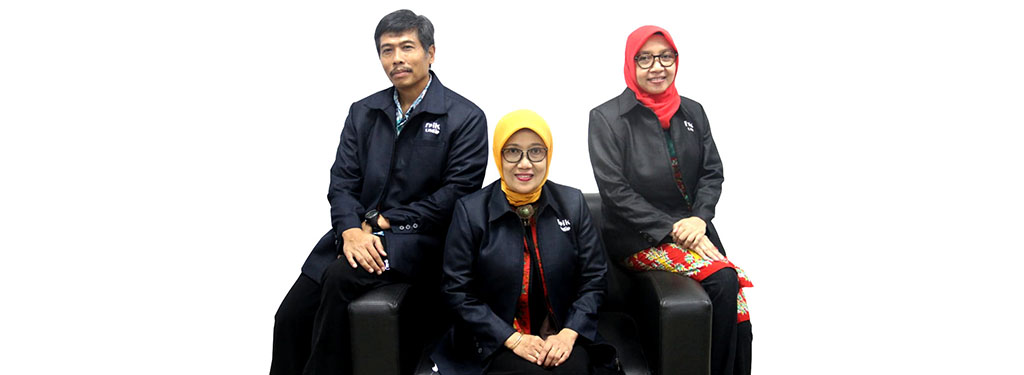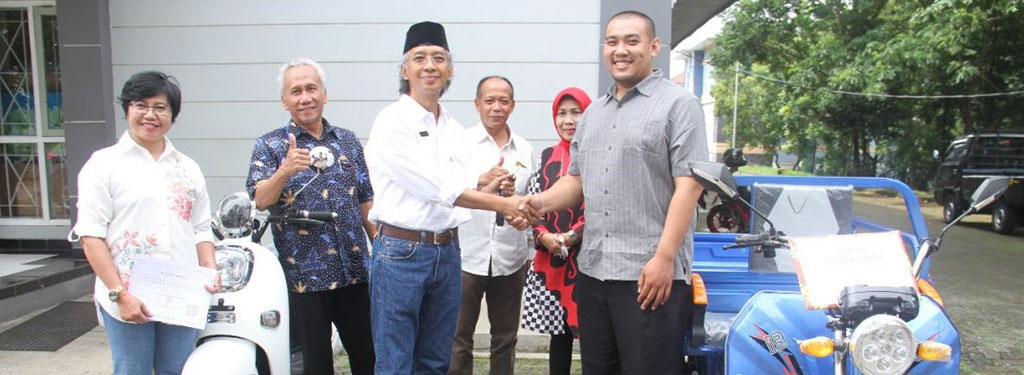Prof. Yos Johan Utama Appoints the Dean of FPIK UNDIP

[et_pb_section fb_built=”1″ admin_label=”section” _builder_version=”4.3.2″ custom_padding=”0px||0px||false|false”][et_pb_row admin_label=”row” _builder_version=”4.3.2″ background_size=”initial” background_position=”top_left” background_repeat=”repeat” custom_padding=”0px||0px||false|false”][et_pb_column type=”4_4″ _builder_version=”3.25″ custom_padding=”|||” custom_padding__hover=”|||”][et_pb_text _builder_version=”4.3.2″ text_orientation=”justified” custom_padding=”0px||0px||false|false” hover_enabled=”0″] FPIK, SEMARANG – Prof. Ir. Tri Winarni Agustini, M.Sc., Ph.D was appointed as the Dean of the Faculty of Fisheries and Marine Science (FPIK) UNDIP 2019-2024 replacing Prof. Dr. Ir. Agus Sabdono, M.Sc on Monday (05/Aug/2020) […]
Alumni of Aquatic Resources Management UNDIP, class of 2008 Donates Electric Motors

[et_pb_section fb_built=”1″ admin_label=”section” _builder_version=”4.3.2″ custom_padding=”0px||0px||false|false”][et_pb_row admin_label=”row” _builder_version=”4.3.2″ background_size=”initial” background_position=”top_left” background_repeat=”repeat” custom_padding=”0px||0px||false|false”][et_pb_column type=”4_4″ _builder_version=”3.25″ custom_padding=”|||” custom_padding__hover=”|||”][et_pb_text admin_label=”Text” _builder_version=”4.3.2″ background_size=”initial” background_position=”top_left” background_repeat=”repeat” hover_enabled=”0″] FPIK, SEMARANG – The concern of Diponegoro University’s Faculty of Fisheries and Marine Sciences (FPIK) alumni to their alma mater was again shown by an Alumni of the Aquatic Resources Management Study Program. Hengki […]
Department of Oceanography is ISO 9001: 2015 Certified
[et_pb_section fb_built=”1″ admin_label=”section” _builder_version=”4.3.2″ custom_padding=”0px||0px||false|false”][et_pb_row admin_label=”row” _builder_version=”4.3.2″ background_size=”initial” background_position=”top_left” background_repeat=”repeat” custom_padding=”0px||0px||false|false”][et_pb_column type=”4_4″ _builder_version=”3.25″ custom_padding=”|||” custom_padding__hover=”|||”][et_pb_text admin_label=”Text” _builder_version=”3.27.4″ background_size=”initial” background_position=”top_left” background_repeat=”repeat”] FPIK, SEMARANG – On January 9th, 2019, the Department of Oceanography, Faculty of Fisheries and Marine Sciences, UNDIP has legally obtained ISO 9001: 2015 certification with the scope of “Management of Higher Education” from the […]
The visit of the Ambassador of Suriname to Indonesia at FPIK
[et_pb_section fb_built=”1″ admin_label=”section” _builder_version=”4.3.2″ custom_padding=”0px||||false|false”][et_pb_row admin_label=”row” _builder_version=”4.3.2″ background_size=”initial” background_position=”top_left” background_repeat=”repeat” custom_padding=”0px||0px||false|false”][et_pb_column type=”4_4″ _builder_version=”3.25″ custom_padding=”|||” custom_padding__hover=”|||”][et_pb_text admin_label=”Text” _builder_version=”3.27.4″ background_size=”initial” background_position=”top_left” background_repeat=”repeat”] FPIK, SEMARANG – The Ambassador of Suriname to Indonesia Ricardo W. Panka, on Friday August 31st, 2018 visited the Faculty of Fisheries and Marine Science UNDIP to explore possible cooperation. Mr. Ricardo, accompanied by staff […]
Introduction to Scientific Diving Karimunjawa 2018
[et_pb_section fb_built=”1″ admin_label=”section” _builder_version=”4.3.2″ custom_padding=”0px||0px||false|false”][et_pb_row admin_label=”row” _builder_version=”4.3.2″ background_size=”initial” background_position=”top_left” background_repeat=”repeat” custom_padding=”0px||0px||false|false”][et_pb_column type=”4_4″ _builder_version=”3.25″ custom_padding=”|||” custom_padding__hover=”|||”][et_pb_text admin_label=”Text” _builder_version=”3.27.4″ background_size=”initial” background_position=”top_left” background_repeat=”repeat”] FPIK, SEMARANG – The dive training program for Kwansei Gakuin University (KGU) students, Japan lasted for 9 days (August 22nd – 30th, 2018) in Semarang City and Karimunjawa Islands. The Summer Course Program of the Faculty […]
Skipjack and Vaname Shrimp, Indonesian Fishery Products Most Exported in March 2017
[et_pb_section fb_built=”1″ admin_label=”section” _builder_version=”4.3.2″ custom_margin=”|||0px|false|false” custom_padding=”0px||0px||false|false”][et_pb_row admin_label=”row” _builder_version=”4.3.2″ background_size=”initial” background_position=”top_left” background_repeat=”repeat” min_height=”1709px” custom_margin=”||||false|false” custom_padding=”0px||0px||false|false”][et_pb_column type=”4_4″ _builder_version=”3.25″ custom_padding=”|||” custom_padding__hover=”|||”][et_pb_text admin_label=”Text” _builder_version=”4.3.2″ background_size=”initial” background_position=”top_left” background_repeat=”repeat” min_height=”1663px”] (Ilustration vaname shrimp/antaranews.com) FPIK, SEMARANG – From the latest data released by the Fish Quarantine Agency, Quality Control and Safety of Fishery Products (BKIPM) of the Ministry of Marine Affairs and […]
